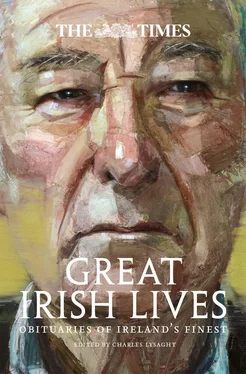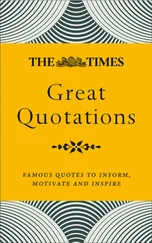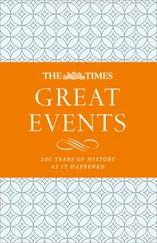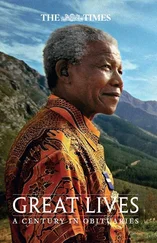The rejection of the Government of Ireland Act by the Sinn Fein leadership and the ongoing assassinations of policemen led the Government to allow free rein to their security forces, the Black and Tans and the Auxiliary cadets. The Times joined in a crescendo of criticism of their disgraceful behaviour and was also highly critical of the hardline reaction of the Lloyd George government to the 74-day hunger strike to death in November 1920 of Terence MacSwiney, the Lord Mayor of Cork. Editorials argued for a settlement along the lines of that eventually agreed in December 1921 granting dominion status to Southern Ireland.
Significantly, when the leading Irish negotiators of that settlement, Arthur Griffith and Michael Collins, died in the early months of independence the obituaries were uncritical. In the case of Collins there was virtually no reference to his part in the campaign of assassination from 1919 to 1921 that had led to his being demonised in Britain before the settlement. The Times had a special reason for being grateful to him as he had applied his ruthless efficiency to securing the safe return of their special correspondent A. B. Kay, who was kidnapped by the IRA in January 1922.
An important influence on the editorial policy of The Times in these years was Captain Herbert Shaw, a Dubliner who had served in the Irish administration and was one of the secretaries to the Irish Convention of 1917–18 where the moderate elements of unionism and nationalism had tried to broker a settlement. It was Shaw who penned The Times editorial entitled ‘Playing the Game’ on the occasion of the opening of the Northern Ireland Parliament in 1921 by King George V that was influential in pushing the Government towards negotiations with the Sinn Fein leaders. He was the author of a number of notable obituaries on Irish figures of that period, some of which, such as that on William T. Cosgrave, did not appear until well after his own death in 1946. Others were written by Michael MacDonagh, the journalist champion and historian of the Irish Party, and the unionist John Healy, editor of the Irish Times , and Dublin correspondent of The Times from 1894 until 1934.
The creation of an independent state covering most of the island of Ireland did not diminish the coverage of Irish affairs in The Times . The Irish were still regarded as part of the broader British family, albeit that their political leaders seemed to want to loosen their ties with it. Even the neutrality in the Second World War did not alter this, perhaps because the Irish of every tradition were such a presence in the British war effort. Churchill spoke for many in Britain when at the end of the war, having criticised Irish neutrality and paid tribute to ‘the thousands of southern Irishmen who hastened to the battle-front to prove their ancient valour’, he expressed the hope that the two peoples would walk together in mutual comprehension and forgiveness.
However, in the quarter of a century after the Second World War Irish political life, both north and south of the border, ceased to command attention in the British media. Even then, a fair coverage of Irish subjects was maintained in The Times obituaries columns. There may have been a bias towards individuals and institutions that retained to some extent a broader British identity or made an impact in Britain and might be presumed to be of more interest to the readership but it did not preclude coverage of significant figures from other strands of Irish life, especially those from the literary and artistic community. The outbreak of violence in Northern Ireland around 1970 brought Ireland centre stage once more and this has been reflected in an even more comprehensive coverage of Irish subjects in the obituaries columns.
Meanwhile, in the course of the twentieth century, there had been significant developments in the paper in the organisation of obituaries loosening the connection of that part of the paper with those who formulated editorial policy. From 1920 there was a separate obituaries department with its own editor. While obituaries had been prepared in advance since the editorship of John Delane (1841–1877), Colin Watson, who was obituaries editor from 1956 to 1981, embarked on a policy of commissioning advance pieces on a wider variety of living subjects than had been the case previously. Very often, those commissioned to write them were not journalists or even professional writers. In general, they were recruited having regard to their knowledge of the subject rather than with an eye to providing a particular viewpoint. In the case of Irish subjects the authors were generally found in Ireland. So it is that more recent Irish obituaries have often not reflected an English viewpoint, let alone that inside The Times – although the authors, if they were doing their job, have been conscious, when writing, that their readership would be largely English.
Despite this general trend, unexpected deaths of notable figures have, on occasion, still thrown the obituaries department back on its own resources. So, when Brian Faulkner died unexpectedly in 1978, Colin Watson ran up a superb obituary that reflected the paper’s sympathy for Faulkner’s brave effort to lead a cross-community executive. Three years earlier in 1975 the death at an advanced age of Eamon de Valera, which cannot have been unexpected, was marked by a much praised obituary involving substantial insider input by the celebrated leader writer Owen Hickey into a piece prepared originally by the former editor of the Irish Times Alec Newman. Hickey, born in Ireland and, incidentally, a grandson of the novelist Canon Hanney (George Bermingham), was an invaluable source of knowledge and understanding about matters Irish for The Times throughout most of the second half of the twentieth century.
The lack of total identification between the editorial policy of the paper and the obituaries that evolved through the twentieth century was never better illustrated than in the case of Sean MacBride, who died in 1988. He had been commander-in-chief of the IRA in post-independence Ireland before becoming a government minister and finally a human rights activist honoured by being awarded both the Nobel and Lenin peace prizes. An obituary prepared by the present writer that was quite laudatory but not uncritical, was followed a couple of days later by an editorial headed ‘His infamous career’ berating him as a man who was to the end of his days a cosmopolitan high priest of the cult of violence directed at British victims.
It is a problem in compiling a volume of Irish obituaries to decide who ranks as sufficiently Irish to be considered for inclusion. One thinks of the remark attributed, probably unfairly, to the Irish-born Duke of Wellington that a horse is not an ass because he is born in an ass’s stable. Obviously, birth outside Ireland, as in the case of Eamon de Valera, would be an inappropriate reason for exclusion. On the other hand, some persons of immense distinction born in Ireland have little meaningful connection with the country. I have been disinclined to include them. In the case of others, of which William Orpen and George Bernard Shaw are examples, omission is referable to the failure of the obituary to do justice to the Irish dimension of the subject’s life.
At the same time I have been concerned not to confine the selection to those who have spent their lives in Ireland or done their significant work there. In particular, it seemed to me important to represent those generally identified as Irish who made an impact not only in Britain but in the Empire and in the United States.
In choosing from a vast store of Irish obituaries over the years, I have sought to strike a balance between the significance of the subject and the quality of the piece. Clearly, any person opening a volume such as this would expect that there would be obituaries of Daniel O’Connell, Charles Stewart Parnell or Eamon de Valera in the political sphere or of William Butler Yeats or James Joyce among the writers. After persons of that calibre, the choices I have made have been affected by the quality of the obituary as well as the significance of the subject. Is it comprehensive or entertaining? Is it the best thing that has been written on a particular person? Is it too long? I have tended to favour those obituaries that give a picture of the person as well as an account of their life’s work. I have also favoured those that paint the subject ‘warts and all’ over less discriminating eulogies. In older pieces I confess to having been attracted by those that betray contemporary attitudes and prejudices. In omitting certain obituaries I have had some regard to their being included in other anthologies of Times obituaries. *
Читать дальше












